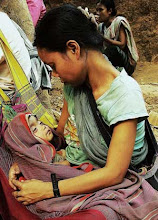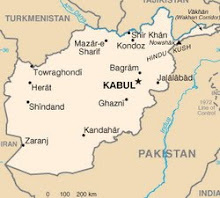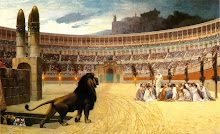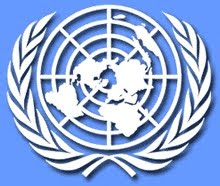
Days before Sweden hosts an international conference aimed at pushing ahead the political and economic reform process in Iraq, hundreds of exiled Iraqi Christians demonstrated outside the country's parliament Sunday to draw attention to the minority's plight in their homeland
."A new wave of ethnic cleansing is going on in Iraq,"Iraqi Christian representative Behiye Hadodo told the gathering
."If these atrocities continue, the Chaldean, Syriac and Assyrian communities there will be wiped out altogether, creating a new catastrophe for humanity."Iraq's Assyrians are a non-Arab ethnic minority located mainly in northeastern Iraq, and adherents of Christian denominations including the Chaldean Catholic and Syriac Orthodox churches.A 1987 census recorded 1.4 million Christians in Iraq, but the numbers began to drop after the 1990 Gulf War, reaching around 800,000 before the U.S. invaded in March 2003.Persecution at the hands of Islamic radicals-killings, church bombings, kidnappings, forced conversions and harassment-has prompted hundreds of thousands of Christians to flee the country since 2003. Although accurate statistics are unavailable, researchers believe the community may have been halved in the past five years.Many have moved to Syria and Jordan, and others to northern Europe, Australia and the United States.Of an estimated 70,000 Iraqi Christians in Europe, nearly half are reported to live in Sweden. Speeches during Sunday's rally in Stockholm centered on continuing harassment by fundamentalists in Iraq, including abductions and assaults of girls and women, and the forcing of women to wear veils in line with strict Islamic doctrines. Participants reiterated calls for international support for an autonomous safe region for Iraqi Christians in the historical Assyrian region in the north of the country.Hadodo, a representative of the European Syriac Union, said the demonstration's goal was to draw the attention of the United States, European Union and United Nations to the "ongoing terror" and especially to the murder of Christian clerics in Iraq.On Thursday, Secretary of State Condoleezza Rice will join counterparts and officials from around the world including U.N. Secretary-General Ban Ki-moon and Iraqi Prime Minister Nouri al-Maliki for a meeting near Stockholm that will follow up last year's launch of the International Compact with Iraq.The compact is a partnership between the Iraqi government and the international community, aimed at pursuing political, economic and social development over a five-year period.Iraqi officials are expected to outline progress made during the past year, with a strong focus on the security situation. Among those due to attend is Iranian Foreign Minister Manouchehr Mottaki, whose government is accused by the U.S. of destabilizing Iraq by supporting insurgents there.Iraq's Christians are hoping that the meeting in Sweden will consider their concerns too.“Since the liberation of Iraq much attention has been devoted to the demands and expectations of Iraq's Shi'a, Sunni, Kurds,” Hermiz Shahen, secretary of the Australian chapter of the Assyrian Universal Alliance, said Wednesday.“Yet the plight of the Assyrian nation is attracting little attention in the outside world.”Pointing to the high number of Christian refugees, Shahen said the international community must make the issue a priority. Within one or two generations, he said, Christians in the Middle East - the birthplace of Christianity - may be reduced to a negligible number, having been forced to flee radical Islam.“It is important that the Assyrian voice be heard [at the meeting in Sweden] and the Assyrian nation be distinctly recognized,” he said. “It is time for the advocates who call for democracy, justice and human rights to stand up for the rights of the indigenous Assyrians of Iraq.”Shahen said Assyrians' demands included equitable representation in government and amendment of the Iraqi constitution to protect Assyrians and allow them “true and equal citizenship.”They also wanted the establishment of an Assyrian governorate or province, administered by Assyrians under the jurisdiction of Iraq's central government. This would encourage refugees, whether internally displaced or outside the country, to return, and enjoy political, educational, linguistic, religious and cultural protection, he said.Prior to the fall of the Saddam Hussein regime, the U.S. designated Iraq as a "country of particular concern" (CPC) for religious freedom violations. The 1998 International Religious Freedom Act allows for a range of steps, including sanctions, to be taken against governments that engage in or tolerate serious religious freedom violations.CPC designation was subsequently lifted, but the U.S. Commission on International Religious Freedom, an independent body advising the White House and Congress, last year placed Iraq on a "watch list" pointing to escalating, unchecked violence against religious minorities as well as "evidence of collusion between Shi'a militias and Iraqi government ministries."Earlier this month, the commission in a letter to Rice said it remained seriously concerned about the situation, citing violence against non-Muslims "from Sunni insurgents and foreign extremists, as well as pervasive violence, discrimination, and marginalization at the hands of the national government, regional governments, and para-state militias, including those in Kurdish areas." Some of the commission's members argue that Iraq should already have be returned to the CPC blacklist, but the commission said it would make a recommendation in the near future, after a visit to Iraq.Earlier this year the Chaldean Catholic archbishop of Mosul, Paulos Faraj Rahho, became the most senior Christian figure to be slain. His body was found after gunmen abducted him at his church, killing three men with him.The Minority Rights Group International says Iraq is the second-most dangerous country in the world for minorities in 2008, behind Somalia and ahead of Sudan, Afghanistan and Burma.
By Patrick Goodenough
CNSNews.com International Editor
As in the days of Noah...
 (May 27, 2008)Xinjiang-CAA has learned that, the trial for Uyghur Christian Alimujiang Yimiti commenced on May 27 at 10am.The trial lasted for 6 hours and 30 minutes.The court recessed from 1pm to 4pm before resuming.Mr. Yimiti was allowed legal representation from two lawyers who were permitted to be present during the trial.Mr. Yimiti’s wife, Nuergul, however was prohibited from entering the courtroom as were members of the media due to the Government’s claims of the sensitivity of the case. At 7:30pm the court reached a verdict that the case be sent back to the original PSB prosecuters due to "insufficient evidence" against the accused.On Monday in Beijing a US delegation led by assistant Secretary of State, David Kramer reinstated human rights dialogue with the Chinese Government. Mr. Yimiti’s case will be one that will be raised to the Government officials. n an interview this morning with CAA’s President Bob Fu, Mr. Yimiti’s wife, Nuergul, restated her husband’s innocence due to the fact that he is an agricultural worker and has no access to state secrets, nor was he engaging in separatist activities.She pleaded for the early release of her husband. She also relayed to Mr. Fu that her two year old daughter points to her father’s picture everyday and tells visitors that herdad is busy buying toy cars for her and will return soon.Nuergul thanked the many people around the world for their continual support and prayers which have continued to strengthen her faith through this difficult time.
(May 27, 2008)Xinjiang-CAA has learned that, the trial for Uyghur Christian Alimujiang Yimiti commenced on May 27 at 10am.The trial lasted for 6 hours and 30 minutes.The court recessed from 1pm to 4pm before resuming.Mr. Yimiti was allowed legal representation from two lawyers who were permitted to be present during the trial.Mr. Yimiti’s wife, Nuergul, however was prohibited from entering the courtroom as were members of the media due to the Government’s claims of the sensitivity of the case. At 7:30pm the court reached a verdict that the case be sent back to the original PSB prosecuters due to "insufficient evidence" against the accused.On Monday in Beijing a US delegation led by assistant Secretary of State, David Kramer reinstated human rights dialogue with the Chinese Government. Mr. Yimiti’s case will be one that will be raised to the Government officials. n an interview this morning with CAA’s President Bob Fu, Mr. Yimiti’s wife, Nuergul, restated her husband’s innocence due to the fact that he is an agricultural worker and has no access to state secrets, nor was he engaging in separatist activities.She pleaded for the early release of her husband. She also relayed to Mr. Fu that her two year old daughter points to her father’s picture everyday and tells visitors that herdad is busy buying toy cars for her and will return soon.Nuergul thanked the many people around the world for their continual support and prayers which have continued to strengthen her faith through this difficult time.


















































.bmp)